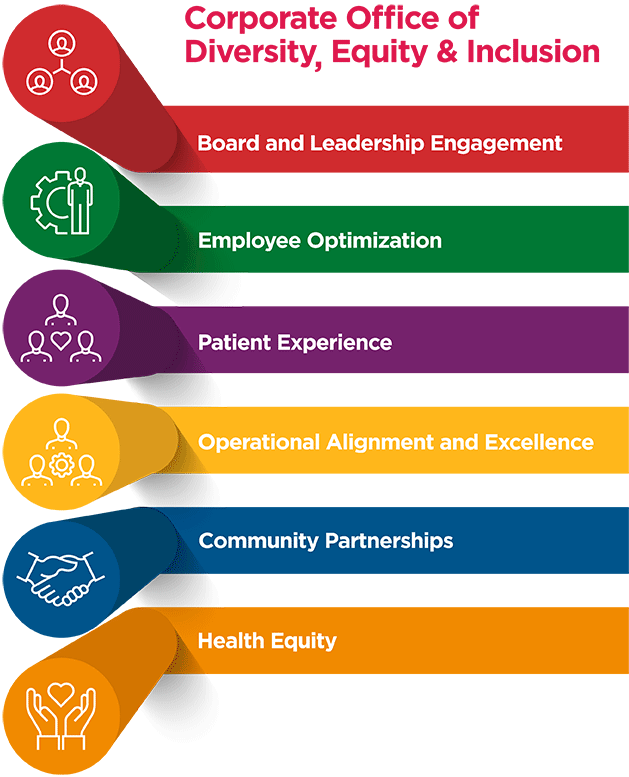Diversity, Equity and Inclusion
at RWJBarnabas Health
At RWJBarnabas Health, we are proud to be a health care leader in New Jersey, the fourth most diverse state in the country. It is our goal to create an equitable environment in which to work and receive care, to champion a diverse workforce and to foster an inclusive setting to improve the health of the diverse patient communities we serve throughout the state.
We embrace the diverse values and beliefs, life experiences and behaviors of our patients, physicians, employees and communities, treating every person with respect and dignity, by tailoring health care delivery and work experiences to meet the social, cultural and linguistic needs of our patients and employees, respectively. Our Diversity, Equity and Inclusion (DEI) leaders guide RWJBarnabas Health to ensure this is achieved in every aspect of our organization’s operations. However, our work does not stop at the organizational level. Our goal of achieving a safe and equitable RWJBarnabas Health also requires individual reflection and effort to learn and grow, to overcome biases, and to look at every situation through lenses of cultural humility and equity.
Let us always reflect on our progress and recognize, respect and appreciate the uniqueness of every individual. Uniqueness includes but is not limited to; race, color, religion, creed, age, marital status, sexual orientation, gender identity or expression, citizenship status, national origin, ethnicity, military/veteran status or ability/disability status which can be reasonably accommodated without undue hardship, or any other classification protected by law. We must practice cultural humility and sensitivity as we care for our patients and their loved ones, our employees and our communities. That is how we will all be healthy together.
Suzette Robinson, MHA
Senior Vice President and Chief Diversity, Equity and Inclusion Officer
RWJBarnabas Health
4/3/23
About DEI at RWJBarnabas Health
Our Diversity, Equity and Inclusion Vision
Every person uses their unique backgrounds and experiences to create solutions for a better, healthier community. Together, we strive to:
- Advance the overall health of the populations we serve.
- Continuously improve the quality of care we provide.
- Collaborate with physicians for a closely coordinated continuum of care.
- Contribute to the local, regional and State economies by remaining a major employer in our communities.
- Focus on the well-being of the diverse communities we serve with a continued commitment to high-quality, equitable and culturally competent care.
- Foster and support a goal of academic excellence, including a commitment to leading-edge research and clinical trials and teaching the next generation of health care workers.
Our Diversity, Equity and Inclusion Objectives
- In alignment with RWJBarnabas Health System’s objective to advance the overall health of our diverse populations, the Corporate Office of Diversity, Equity, and Inclusion aims to treat everyone with respect and dignity while appreciating and embracing the differences as well as the similarities that exist among us, so that RWJBH continues to provide high quality, equitable, culturally-competent, patient-centered care to its diverse patients and communities.
Our Commitment to Diversity, Equity and Inclusion
Our commitment to diversity, equity and inclusion is part of everything we do at RWJBarnabas Health. In addition to our strategic pillars, we are also guided by pledges that reinforce our dedication to providing high quality, equitable, culturally humble and competent care to our patients a workplace that embraces the authentic self of each employee in an equitable way.
#123ForEquity Pledge
America’s hospitals and health systems, including RWJBarnabas Health, are working hard to ensure that every person in every community receives high-quality, equitable and safe care. To do that, we must eliminate health and health care disparities that continue to exist.
To accelerate progress on these efforts, in 2015 the American Hospital Association (AHA) launched the #123forEquity pledge campaign. It builds on the efforts of the National Call to Action to Eliminate Health Care Disparities – a joint effort of the American Hospital Association, American College of Health Care Executives, Association of American Medical Colleges, Catholic Health Association of the United States and America’s Essential Hospitals – and asks hospital and health system leaders to begin taking action to accelerate progress on the following areas:
- Increasing the collection and use of race, ethnicity, language preference and other socio-demographic data
- Increasing cultural competency training
- Increasing diversity in leadership and governance
- Improve and strengthen community partnerships
CEO Action Pledge
CEO Action for Diversity & Inclusion™ signatories are committed to building productive, diverse and inclusive workplaces. RWJBarnabas Health joins more than 2,400 CEOs who have pledged to:
- Cultivate environments that support open dialogue on complex – and often difficult - conversations around diversity, equity and inclusion.
- Implement and expand unconscious bias education and training.
- Share best-known diversity, equity and inclusion programs/initiatives – as well as those that have been unsuccessful.
- Engage boards of directors when developing and evaluating diversity, equity and inclusion strategies.
The Diversity, Equity and Inclusion Pillars
To sustain our DEI objectives and vision and to measure the work of the Office of Diversity, Equity & Inclusion, we are guided by six strategic pillars that ensure we embrace everything that makes our patients, physicians and employees unique. In doing so, we provide high quality, equitable, culturally humble and competent care to our patients and our communities.

- Board and Leadership Engagement
- Employee Optimization
- Patient Experience
- Operational Alignment and Excellence
- Community Partnership
- Health Equity
-
 Board and Leadership Engagement
Board and Leadership Engagement
- Provide Diversity, Equity & Inclusion education to all hospital Boards. Since 2016, more than 76 diverse Board members have joined Boards throughout RWJBarnabas Health.
- Diversity, Equity & Inclusion subcommittee of the Parent Board, which oversees the comprehensive recruitment efforts of diverse trustees for placement considerations.
-
 Employee Optimization
Employee Optimization
RWJBarnabas Health offers members of all races, ethnicities, and cultures of the RWJBarnabas Health workforce a safe, nurturing, equitable, and just environment in which to work, that affords professional development opportunities, potential for growth, and avenues for their voices to be heard. RWJBarnabas Health provides equal employment opportunity to all persons without regard to race, color, religion, creed, age, marital status, sexual orientation, gender identity or expression, citizenship status, national origin, ethnicity, military/veteran status or disability which can be reasonably accommodated without undue hardship, or any other classification protected by law.
Here are some additional ways RWJBH ensures a safe, equitable and just workplace and workforce:
-
RWJBarnabas Health’s current workforce composition is:
- Asian – 18%
- Black – 22%
- Hispanic – 15%
- White – 41%
- Other – 4%
- Introduction to DEI concepts and practice at RWJBH at Embark, the RWJBH new employee orientation.
- Implicit Bias and Cultural Humility eLearning module for clinicians.
- Over 50 Business Resource Groups (BRGs) are available within the RWJBarnabas Health system. These employee-led groups are based on shared characteristics and/or life experiences to provide support to fellow colleagues, foster career development and to contribute to cultural sensitivity in the work environment.
- LGBTQ+ sensitivity Training for all System employees.
- Open sessions facilitating discussions regarding race, systemic racism, health disparities and unconscious bias, among other topics.
-
 Patient Experience
Patient Experience
RWJBH works to ensure that patients of all races, ethnicities, and cultures are afforded safe, high-quality, equitable clinical care. By addressing issues such as health disparities, health care access and implicit bias in the clinical setting, RWJBarnabas Health seeks to ensure high-quality and reliable health care for all patients.
- Analysis of Race, Ethnicity and Language (REaL) and Sexual Orientation and Gender Identity (SOGI) data to determine disparities and implement an active improvement plan for execution.
- In collaboration with Patient Access, facilitate trainings and the implementation of new entry fields in the electronic health record software to ensure an equitable model of internal operations.
- Patient Non-discrimination – RWJBarnabas Health is committed to providing every person who enters our doors with an environment free from discrimination or harassment. RWJBarnabas Health does not exclude, deny services, or engage in other forms of discrimination or harassment based upon the following protected categories: race, creed, color, national origin, nationality, ancestry, age, sex/gender (including pregnancy), marital status, civil union status, domestic partnership status, familial status, religion, affectional or sexual orientation, gender identify or expression, atypical hereditary cellular or blood trait, genetic information, liability for service in the Armed Forces of the United States, or disability.
- Equal Visitation – RWJBarnabas Health promotes the healing and well-being of our patients by supporting visitation by family members and others. RWJBarnabas Health does not restrict or deny visitation privileges on the basis of race, color, nationality, religion, gender, sexual orientation, gender identity or expression, or disability. RWJBarnabas Health assures that all visitors enjoy full and equal visitation privileges consistent with patient preferences "regardless of whether the visitor is a family member, a spouse, a domestic partner (including a same-sex domestic partner), or other type of visitor, as well as their right to withdraw such consent to visitation at any time."
- The Health Care Equality Index (HEI) is the national LGBTQ+ benchmarking tool that evaluates health care facilities' policies and practices related to the equity and inclusion of their LGBTQ+ patients, visitors and employees. Currently, thirteen RWJBarnabas Health’s hospitals have earned the Health Care Equality Index Leader designations:
- Children’s Hospital of New Jersey at Newark Beth Israel Medical Center
- Children's Specialized Hospital
- Clara Maass Medical Center
- Community Medical Center
- Cooperman Barnabas Medical Center
- Jersey City Medical Center
- Monmouth Medical Center
- Newark Beth Israel Medical Center
- Robert Wood Johnson University Hospital
- Robert Wood Johnson University Hospital Hamilton
- Robert Wood Johnson University Hospital Rahway
- Robert Wood Johnson University Hospital Somerset
- The Bristol-Myers Squibb Children’s Hospital at Robert Wood Johnson University Hospital
-
 Operational Alignment and Excellence
Operational Alignment and Excellence
RWJBH consistently reviews and revise operational processes and procedures to ensure a diverse, equitable and inclusive RWJBH for everyone.
- DEI culture is embedded into the System culture and strategy.
- Centralization and optimization of DEI resources – while ensuring local customization for each hospital’s unique communities – supports the achievement of DEI goals.
-
 Community Partnership
Community Partnership
To support our goals of continuing to improve the health of the communities we serve, our System collaborates with community stakeholders to improve trust and ensure better outcomes in alignment with the #123forEquity Pledge.
-
 Health Equity
Health Equity
RWJBH takes a comprehensive and strategic approach to address health disparities in our communities. As one of the largest employers and a major economic engine in communities across the State, it is our responsibility to play a major role in improving health outcomes for all communities across New Jersey.
RWJBH achieves this by leveraging its power as an anchor institution to stimulate local economies by buying, hiring, and investing in local efforts that are known to promote positive health outcomes. RWJBH also addresses issues such as food insecurity, housing affordability and community development in its work to promote equity.
The System remains committed to the goal of creating healthier communities; increasing health equity in the communities it serves helps us to achieve that goal.



